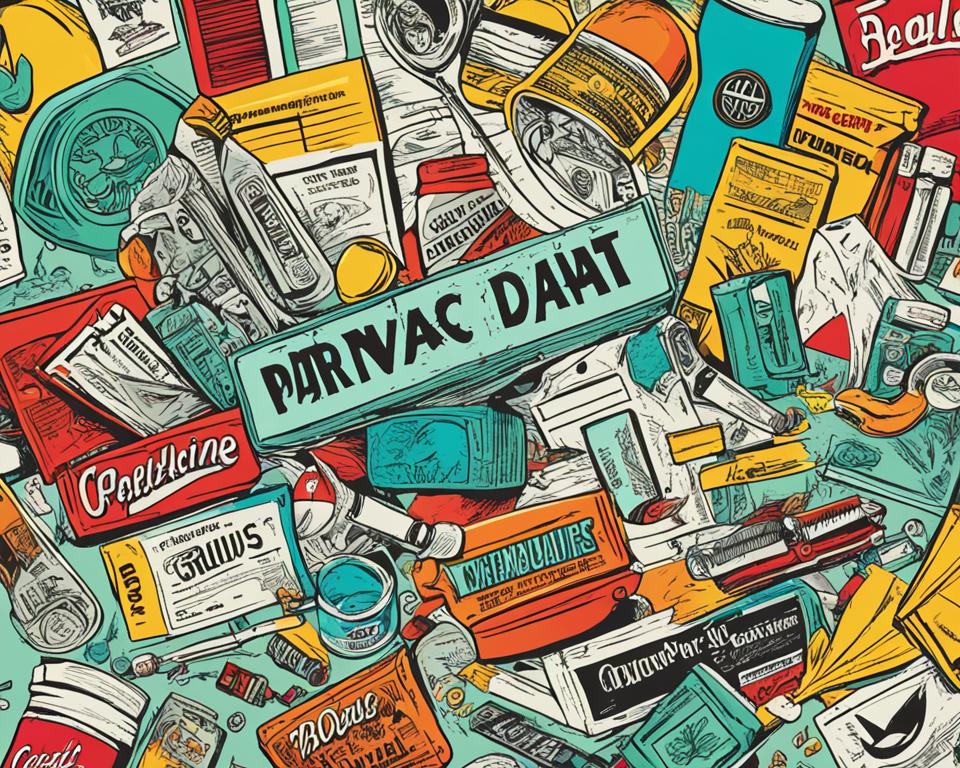Drug-related films have long been a captivating and thought-provoking genre in cinema. From gritty dramas to surreal art films, these movies delve into the complex world of substance abuse, drug addiction, and the impact of drugs on individuals and society. Depicting everything from the allure of drugs to the devastating consequences of addiction, these films offer a unique perspective on the intricate relationship between humans and narcotics.
Key Takeaways:
- Movies about drugs provide an in-depth exploration of addiction and its consequences
- They shed light on the complexities of substance abuse and its impact on individuals and society
- The genre includes a diverse range of films, from intense dramas to crime thrillers
- Directors like Aronofsky, Tarantino, Scorsese, Hopper, and Boyle have crafted compelling narratives in this genre
- These films offer a unique perspective and deeper understanding of the allure and dangers of drugs
Table of Contents
Aronofsky’s Dark Drama: Requiem for a Dream (2000)
“Requiem for a Dream” is a powerful drama directed by Darren Aronofsky. It explores the lives of four people in Coney Island whose addictions slowly destroy their dreams. The film delves into the dark realities of drug addiction and the impact it has on individuals and their relationships. The stellar cast includes Ellen Burstyn, Jared Leto, and Jennifer Connelly.
Plot Summary
In “Requiem for a Dream,” the lives of Sara Goldfarb (Ellen Burstyn), Harry Goldfarb (Jared Leto), Marion Silver (Jennifer Connelly), and Tyrone C. Love (Marlon Wayans) intertwine as they chase their dreams while battling addiction. Sara becomes obsessed with appearing on her favorite television show, leading her to take dangerous diet pills. Harry and his girlfriend Marion sink deeper into heroin addiction, desperately seeking their next fix. Tyrone, Harry’s best friend, finds himself caught up in the drug trade.
Themes and Symbolism
The movie explores various themes related to drug addiction, including the destructive nature of addiction, shattered dreams, and the loss of identity. Aronofsky employs creative visual techniques and a haunting soundtrack to immerse viewers in the characters’ downward spirals. The use of vivid imagery and frenetic editing intensifies the emotional impact of the film.
Critical Acclaim
“Requiem for a Dream” received critical acclaim for its raw and unflinching portrayal of addiction. Aronofsky’s directing and the performances by Burstyn, Leto, Connelly, and Wayans were widely praised. The film has since garnered a cult following and is considered a seminal work in Aronofsky’s filmography.
| Director | Cast |
|---|---|
| Darren Aronofsky | Ellen Burstyn, Jared Leto, Jennifer Connelly, Marlon Wayans |
Tarantino’s Masterpiece: Pulp Fiction (1994)
Tarantino’s “Pulp Fiction” is a crime film that shattered narrative conventions and became a cultural phenomenon. Released in 1994, the movie follows the intertwining lives of several characters, including hitmen Vincent Vega and Jules Winnfield, boxer Butch Coolidge, and gangster Marsellus Wallace.
With its nonlinear structure, “Pulp Fiction” masterfully weaves together multiple storylines, creating a captivating tapestry of violence, dark humor, and redemption. Quentin Tarantino’s signature sharp dialogue and stylized storytelling techniques keep audiences on the edge of their seats.
In this genre-defying film, drugs play a significant role, adding another layer of intrigue and complexity. Cocaine, in particular, features prominently throughout the narrative, highlighting the allure and destructive power of substance abuse.
Featuring an ensemble cast that includes John Travolta, Uma Thurman, Samuel L. Jackson, and Bruce Willis, “Pulp Fiction” boasts exceptional performances that bring Tarantino’s vision to life. Travolta’s portrayal of Vincent Vega and Thurman’s iconic role as Mia Wallace have become legendary in cinema history.
This critically acclaimed film continues to captivate audiences and is widely regarded as one of Tarantino’s greatest achievements. Its impact on popular culture and the film industry is undeniable, solidifying Tarantino’s status as a visionary director.
| Main Characters | Actor/Actress |
|---|---|
| Vincent Vega | John Travolta |
| Mia Wallace | Uma Thurman |
| Jules Winnfield | Samuel L. Jackson |
| Butch Coolidge | Bruce Willis |
Scorsese’s Tale of Excess: The Wolf of Wall Street (2013)
The Wolf of Wall Street, directed by Martin Scorsese, takes audiences on a wild journey through the life of Jordan Belfort, a wealthy stockbroker who becomes entangled in a world of crime, corruption, and excessive drug use. Drawing inspiration from Belfort’s memoir, the film showcases the allure of wealth and the consequences of unchecked indulgence.
Leonardo DiCaprio delivers a mesmerizing performance as Belfort, capturing the charismatic yet morally bankrupt nature of the character. DiCaprio’s portrayal earned him critical acclaim and further solidified his collaboration with Scorsese as one of great cinematic merit.
The Wolf of Wall Street also features an impressive supporting cast, including Jonah Hill, Margot Robbie, and Matthew McConaughey. Hill shines in his role as Belfort’s loyal yet eccentric business partner, while Robbie delivers a breakout performance as Belfort’s alluring and equally ambitious wife.
Scorsese’s direction masterfully captures the excess and hedonism prevalent in Belfort’s world, immersing the audience in a whirlwind of opulence and debauchery. The film’s high-energy narrative and dark humor keep viewers engaged from start to finish, while shedding light on the consequences of unchecked greed and the devastating impact of substance abuse.
Table: Cast of The Wolf of Wall Street
| Actor | Character |
|---|---|
| Leonardo DiCaprio | Jordan Belfort |
| Jonah Hill | Donnie Azoff |
| Margot Robbie | Naomi Lapaglia |
| Matthew McConaughey | Mark Hanna |
The Wolf of Wall Street stands as a testament to the collaboration between Martin Scorsese and Leonardo DiCaprio, two titans of the film industry. Together with a stellar cast and Scorsese’s masterful direction, the film explores the seductive nature of wealth and the consequences of unchecked ambition. It serves as a captivating reminder of the fragility of morality when confronted with the temptation of excess.
Hopper’s Classic Ride: Easy Rider (1969)
Directed by Dennis Hopper, Easy Rider is a counterculture film that takes viewers on a motorcycle journey through America. This iconic movie explores themes of freedom, rebellion, and the search for meaning. The characters’ experiences are influenced by drugs, including LSD and marijuana, as they navigate their way through the open road. The film features an outstanding cast, including Peter Fonda, Dennis Hopper, and Jack Nicholson.
Easy Rider is considered a landmark film in American cinema and is widely recognized for its exploration of the cultural shifts and social unrest that characterized the late 1960s. As the characters embark on their journey, they encounter a variety of people and communities, each representing a different aspect of American society at the time.
The film’s visual style, innovative soundtrack, and portrayal of the counterculture movement have made Easy Rider an enduring symbol of the era. It serves as both a time capsule of the ’60s and a reflection of the timeless desire for freedom and self-discovery.
Boyle’s Edinburgh Exploration: Trainspotting (1996)
“Trainspotting” directed by Danny Boyle, is a raw and darkly comic drama set in Edinburgh, Scotland. The film follows Renton, a young man deeply immersed in the city’s drug scene, as he grapples with addiction and the desire to break free. Ewan McGregor leads an exceptional ensemble cast, including Ewen Bremner, Jonny Lee Miller, and Kevin McKidd.
“Trainspotting” is hailed as a cult classic and has garnered critical acclaim for its bold portrayal of addiction and its impact on individuals. The film skillfully balances gritty realism with dark humor, capturing the despair, frenetic energy, and reckless abandon of its characters. Through its relentless and unflinching narrative, “Trainspotting” exposes the harsh realities of drug addiction, while also exploring themes of friendship, identity, and the power of choice.
The performances in “Trainspotting” are outstanding, with Ewan McGregor delivering a captivating portrayal of Renton, a character torn between self-destruction and the possibility of redemption. The supporting cast, including Ewen Bremner as the socially awkward Spud, Jonny Lee Miller as the shrewd and manipulative Sick Boy, and Kevin McKidd as the hot-headed Tommy, bring depth and authenticity to their roles. Their chemistry and compelling performances contribute to the film’s enduring appeal.
Visually, “Trainspotting” is striking, with director Danny Boyle employing a dynamic and innovative filmmaking style that reflects the chaotic lives of the characters. The film’s iconic scenes, such as Renton’s famous “Choose Life” monologue and the unforgettable “worst toilet in Scotland” sequence, have become indelible moments in cinema history.
Trainspotting Soundtrack
One of the standout aspects of “Trainspotting” is its iconic soundtrack, which features a diverse range of music that perfectly complements the film’s themes and tone. The soundtrack includes tracks from notable artists such as Iggy Pop, Underworld, Lou Reed, and Brian Eno, creating a powerful sonic landscape that enhances the viewing experience.
| Song | Artist |
|---|---|
| Lust for Life | Iggy Pop |
| Born Slippy .NUXX | Underworld |
| Perfect Day | Lou Reed |
| Mile End | Pulp |
| Deep Blue Day | Brian Eno |
The “Trainspotting” soundtrack not only serves as a time capsule of the mid-90s music scene but also enhances the emotional impact of the film, creating an immersive and unforgettable audiovisual experience.
Conclusion
Movies about drugs offer a captivating and thought-provoking exploration of addiction, the consequences of drug use, and the impact of drugs on society. These films provide a platform for filmmakers to shed light on the complexities of substance abuse and delve into the dark underbelly of drug addiction. From intense dramas like “Requiem for a Dream” to star-studded crime films like “Pulp Fiction” and “The Wolf of Wall Street,” directors such as Aronofsky, Tarantino, Scorsese, Hopper, and Boyle have crafted narratives that both entertain and educate.
Through cinematic portrayal of substance abuse, audiences gain a deeper understanding of the intricate relationship between drugs and individuals, as well as their effect on society. These films confront the allure of drugs and the devastating consequences that often follow. They challenge viewers to reflect on the impact of drug addiction and its far-reaching effects, encouraging important conversations and raising awareness about the issue.
The exploration of addiction in drug films serves as a reminder that substance abuse is a complex and multifaceted problem that requires attention and empathy. By humanizing the struggles faced by individuals battling addiction, these movies aim to bridge the gap between reality and perception, fostering a deeper understanding and empathy in society. Overall, drug films play a significant role in sparking dialogue, raising awareness, and influencing social change when it comes to the impact of drugs on individuals and society as a whole.


